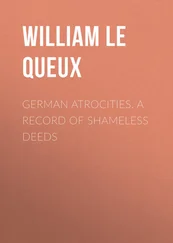William Le Queux - As We Forgive Them
Здесь есть возможность читать онлайн «William Le Queux - As We Forgive Them» — ознакомительный отрывок электронной книги совершенно бесплатно, а после прочтения отрывка купить полную версию. В некоторых случаях можно слушать аудио, скачать через торрент в формате fb2 и присутствует краткое содержание. Жанр: foreign_prose, на английском языке. Описание произведения, (предисловие) а так же отзывы посетителей доступны на портале библиотеки ЛибКат.
- Название:As We Forgive Them
- Автор:
- Жанр:
- Год:неизвестен
- ISBN:нет данных
- Рейтинг книги:3 / 5. Голосов: 1
-
Избранное:Добавить в избранное
- Отзывы:
-
Ваша оценка:
- 60
- 1
- 2
- 3
- 4
- 5
As We Forgive Them: краткое содержание, описание и аннотация
Предлагаем к чтению аннотацию, описание, краткое содержание или предисловие (зависит от того, что написал сам автор книги «As We Forgive Them»). Если вы не нашли необходимую информацию о книге — напишите в комментариях, мы постараемся отыскать её.
As We Forgive Them — читать онлайн ознакомительный отрывок
Ниже представлен текст книги, разбитый по страницам. Система сохранения места последней прочитанной страницы, позволяет с удобством читать онлайн бесплатно книгу «As We Forgive Them», без необходимости каждый раз заново искать на чём Вы остановились. Поставьте закладку, и сможете в любой момент перейти на страницу, на которой закончили чтение.
Интервал:
Закладка:
It was astonishing, too, what a crowd of well-known faces I passed that morning – English peers and peeresses, Members of Parliament, financial magnates, City sharks, manufacturers, and tourists of every grade and of every nation.
His Highness the Count of Turin, returning from drill, rode by laughing with his aide-de-camp and saluting those he knew. The women mostly wore their smartest toilettes with fur, because a cold wind came up from the Arno, the scent of flowers was in the air, bright laughter and incessant chatter sounded everywhere, and the red-roofed old Lily City was alive with gaiety. Perhaps no city in all the world is so full of charm nor so full of contrasts as quaint old Florence, with her wonderful cathedral, her antique bridge with rows of jewellers’ shops upon it, her magnificent churches, her ponderous palaces, and her dark, silent, mediaeval streets, little changed, some of them, since the days when they were trodden by Giotto and by Dante. Time has laid his hand lightly indeed upon the City of Flowers, but whenever he has done so he has altered it out of all recognition, and the garish modernity of certain streets and piazzas surely grates to-day upon those who, like myself, knew the old city before the Piazza Vittorio – always the Piazza Vittorio, synonym of vandalism – had been constructed, and the old Ghetto, picturesque if unclean, was still in existence.
Two men, both of them Italian, stopped to salute me as I walked, and to wish me ben tornato . One was an advocate whose wife was accredited one of the prettiest women in that city where, strangely enough, the most striking type of beauty is fair-haired. The other was the Cavaliere Alinari, secretary to the British Consul-General, or the “Major,” as everybody speaks of him.
I had only arrived in Florence two hours before, and, after a wash at the Savoy , had gone forth with the object of cashing a cheque at French’s, prior to commencing my inquiries.
Meeting Alinari, however, caused me to halt for a moment, and after he had expressed pleasure at my return, I asked —
“Do you, by any chance, happen to know any one by the name of Melandrini – Paolo Melandrini? His address is given me as Via San Cristofano, number eight.”
He looked at me rather strangely with his sharp eyes, stroked his dark beard a moment, and replied in English, with a slight accent —
“The address does not sound very inviting, Mr Greenwood. I have not the pleasure of knowing the gentleman, but the Via San Cristofano is one of the poorest and worst streets in Florence, just behind Santa Croce from the Via Ghibellina. I should not advise you to enter that quarter at night. There are some very bad characters there.”
“Well,” I explained, “the fact is I have come down here expressly to ascertain some facts concerning this person.”
“Then don’t do it yourself,” was my friend’s strong advice. “Employ some one who is a Florentine. If it is a case of confidential inquiries, he will certainly be much more successful than you can ever be. The moment you set foot in that street it would be known in every tenement that an Inglese was asking questions. And,” he added with a meaning smile, “they resent questions being asked in the Via San Cristofano.”
Chapter Seven
The Mysterious Foreigner
I felt that his advice was good, and in further conversation over a piccolo at Giacosa’s he suggested that I should employ a very shrewd but ugly little old man named Carlini, who sometimes made confidential inquiries on behalf of the Consulate.
An hour later the old man called at the Savoy , a bent, shuffling, white-headed old fellow, shabbily dressed, with a grey soft felt rather greasy hat stuck jauntily on the side of his head – a typical Florentine of the people. They called him “Babbo Carlini” in the markets, I afterwards learned, and cooks and servant-girls were fond of playing pranks upon him. Believed by every one to be a little childish, he fostered the idea because it gave him greater facilities in his secret inquiries, for he was regularly employed by the police in serious cases, and through his shrewdness many a criminal had been brought to justice.
In the privacy of my bedroom I explained in Italian the mission I wished him to execute for me.
“Si, signore,” was all he responded, and this at every pause I made.
His boots were sadly cracked and down at heel, and he was badly in want of clean linen, but from his handkerchief pocket there arose a small row of “toscani,” those long, thin, penny cigars so dear to the Italian palate.
“Recollect,” I impressed upon the old fellow, “you must, if possible, find a way of striking up an acquaintance with this individual, Paolo Melandrini, obtain from him all you can about himself, and arrange so that I have, as soon as possible, an opportunity of seeing him without being myself observed. This matter,” I added, “is strictly confidential, and I engage you for one week in my service at a wage of two hundred and fifty lire. Here are one hundred to pay your current expenses.”
He took the green banknotes in his claw-like hand, and with a muttered “Tanti grazie, signore,” transferred it to the inner pocket of his shabby jacket.
“You must on no account allow the man to suspect that any inquiry is being made concerning him. Mind that he knows nothing of any Englishman in Florence asking about him, or it will arouse his suspicions at once. Be very careful in all that you say and do, and report to me to-night. At what time shall I meet you?”
“Late,” the old fellow grunted. “He may be a working-man, and if so I shall not be able to see anything of him till evening. I’ll call here at eleven o’clock to-night,” and then he shuffled out, leaving an odour of stale garlic and strong tobacco.
I began to wonder what the hotel people would think of me entertaining such a visitor, for the Savoy is one of the smartest in Florence, but my apprehensions were quickly dispelled, for as we passed out I heard the uniformed hall-porter exclaim in Italian —
“Hulloa, Babbo! Got a fresh job?”
To which the old fellow only grinned in satisfaction, and with another grunt passed out into the sunshine.
That day passed long and anxiously. I idled on the Ponte Vecchio and in the dim religious gloom of the Santissima Anunziata, in the afternoon making several calls upon friends I had known, and in the evening dining at Doney’s in preference to the crowded table-d’hôte of English and Americans at the Savoy .
At eleven I awaited old Carlini in the hall of the hotel, and on his arrival took him anxiously in the lift up to my room.
“Well,” he commenced, speaking in his slightly-lisping Florentine tongue, “I have been pursuing inquiries all day, but have discovered very little. The individual you require appears to be a mystery.”
“I expected so,” was my reply. “What have you discovered regarding him?”
“They know him in Via San Cristofano. He has a small apartment on the third floor of number eight, which he only visits occasionally. The place is looked after by an old woman of eighty, whom I managed to question. Discovering that this Melandrini was absent and that a cloth was hanging from the window to dry, I presented myself as an agent of police to explain that the hanging out of a cloth was a contravention of the law and liable to a fine of two francs. I then obtained from her a few facts concerning her padrone . She told me all she knew, which did not amount to much. He had a habit of arriving suddenly, generally at evening, and staying there for one or two days, never emerging in the daytime. Where he lived at other times she did not know. Letters often came for him bearing an English stamp, and she kept them. Indeed, she showed me one that arrived ten days ago and is now awaiting him.”
Читать дальшеИнтервал:
Закладка:
Похожие книги на «As We Forgive Them»
Представляем Вашему вниманию похожие книги на «As We Forgive Them» списком для выбора. Мы отобрали схожую по названию и смыслу литературу в надежде предоставить читателям больше вариантов отыскать новые, интересные, ещё непрочитанные произведения.
Обсуждение, отзывы о книге «As We Forgive Them» и просто собственные мнения читателей. Оставьте ваши комментарии, напишите, что Вы думаете о произведении, его смысле или главных героях. Укажите что конкретно понравилось, а что нет, и почему Вы так считаете.












